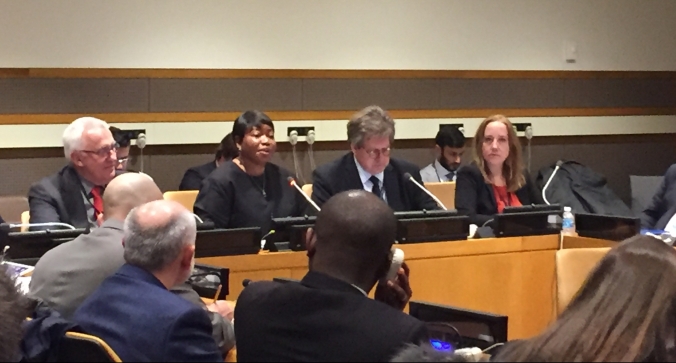 Today, Day 2 of the Assembly of the States Parties (ASP) to the International Criminal Court (ICC), the first NGO Advocacy Strategy Meeting was held, led by the Coalition for the International Criminal Court (CICC). The CICC also organized a question and answer session with the Prosecutor and Deputy Prosecutor of the ICC – Fatou Bensouda and James Stewart – and members of civil society. The significant presence of the CICC in the ASP was therefore evident throughout the day. This post will discuss the role of the CICC, which has always been an important actor in relation to the ICC.
Today, Day 2 of the Assembly of the States Parties (ASP) to the International Criminal Court (ICC), the first NGO Advocacy Strategy Meeting was held, led by the Coalition for the International Criminal Court (CICC). The CICC also organized a question and answer session with the Prosecutor and Deputy Prosecutor of the ICC – Fatou Bensouda and James Stewart – and members of civil society. The significant presence of the CICC in the ASP was therefore evident throughout the day. This post will discuss the role of the CICC, which has always been an important actor in relation to the ICC.
At its creation in 1995, the Coalition only comprised a small number of NGOs supportive of the establishment of an International Criminal Court. After the Court was established, the CICC continued to work at every stage of its development, and strives now towards the larger goal of fighting against impunity by improving the ICC’s effectiveness, independence, and accessibility. It also addresses the most urgent issues faced by the international justice system and seeks to improve it. Now consisting of more than 2,500 civil society members from 150 countries, the CICC is the world’s largest civil society partnership advancing international justice.
The important role of the CICC in relation to the ICC was recognized as early as the ASP’s second session, in September 2003, when the Resolution on the Recognition of the coordinating and facilitating role of the NGO Coalition for the International Criminal Court (ICC-ASP/2/Res.8) was adopted by consensus. In that resolution, States Parties recognized that the CICC performs a coordinating and facilitating role between the community of NGOs and the ASP, and between that community and the ICC.
Concretely, before each ASP, the CICC engages in making knowledge accessible to all by producing information documents explaining the Assembly and the ICC, as well as issuing recommendations. During the ASP, the Coalition organizes daily NGOs advocacy strategy meetings, where NGOs can meet, collaborate, exchange information and develop a common strategy.
For instance, in this morning’s strategy meeting, the CICC and few other NGOs delegates underlined the reluctance of many States Parties to discuss issues pertaining to the ICC budget because of the complexity and political sensitivity of this topic. They highlighted that this situation creates a void that gives States Parties who advocate for budgetary cuts a free hand to frame and lead the negotiations on this agenda item. The CICC thus encouraged civil society members to reach out to the silent States, raise questions and encourage them to speak out and counter the current restrictive budgetary narrative. During the ASP, the CICC also relays information on the various outcomes of each event, notably on its website, and issues press releases.
Furthermore, the CICC organizes side-events in order to allow civil society members to express their views, such as today’s civil society-only meeting with Prosecutor Fatou Bensouda and Deputy Prosecutor James Stewart. This meeting gave the opportunity to NGO delegates – including my delegation, the Canadian Partnership for International Justice – to ask questions directly of the Prosecutor and Deputy Prosecutor and get answers that would inform the civil society’s understanding of OTP’s needs and strategies, notably on the situation in Libya, the implementation of the 2014 Policy Paper on Sexual and Gender Based Crimes, and Burundi’s withdrawal from the Rome Statute.
The CICC has proven to be a key interlocutor within the ASP, bringing a careful focus on topics rather than politics. While CICC is funded by States, it only takes action on the basis of common principles to which there is a widespread consensus among the Coalition’s members. In sum, it is hard to imagine the ICC and the ASP without the CICC, given its size, breadth of focus and impact – as today’s meeting demonstrate.
This blog post and Catherine Savard’s attendance at the 16th Assembly of States Parties in the framework of the Canadian Partnership for International Justice are supported by the Social Sciences and Humanities Research Council of Canada.

